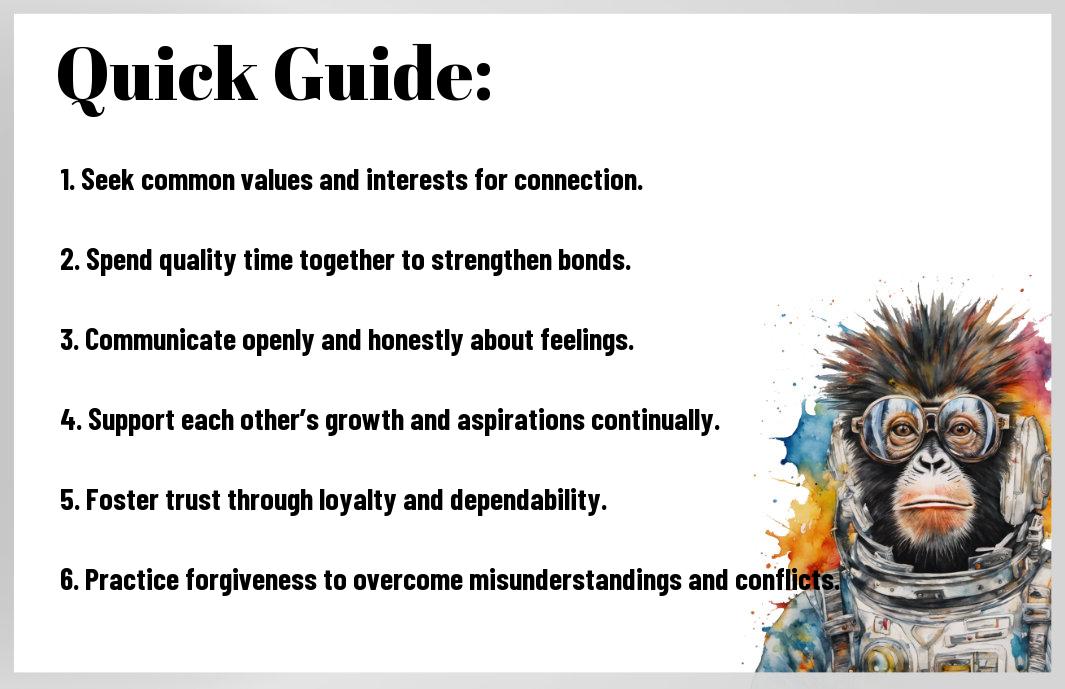
Newsletter Subscribe
Enter your email address below and subscribe to our newsletter

Enter your email address below and subscribe to our newsletter

Friendships are some of the most enriching experiences in our lives, and I believe we can learn a lot from Aristotle’s insights on building strong connections. In this guide, I’ll share some timeless wisdom from the great philosopher that can help you cultivate deep, lasting friendships. By understanding his thoughts on loyalty, trust, and shared values, you can enhance your relationships and create bonds that stand the test of time. Let’s explore how Aristotle’s teachings can transform the way you approach friendship!


As I reflect on the friendships in my life, I can see that they come in various forms and serve different purposes. Understanding these different types of friendships can help you appreciate the connections you have and deepen your bonds with others. For instance, it’s not uncommon to categorize friendships by their significance and the level of intimacy involved. Here’s a bit of a breakdown:
| Type of Friendship | Characteristics |
|---|---|
| Acquaintances | Casual interactions; often linked to work or social events. |
| Casual Friends | More personal than acquaintances; may share common interests. |
| Close Friends | Emotional support; share thoughts, feelings, and experiences. |
| Best Friends | Deep trust and loyalty; often the ones with whom we share life’s milestones. |
| Life-long Friends | Connections that withstand the test of time and change. |
Friendship often evolves over time. You may find that the people you were once close to can transform into lifelong friends as your lives intertwine more deeply. I love thinking about how friendships can grow; some may start as simple acquaintances but develop into incredibly meaningful relationships. The richness of friendship lies in its flexibility—each type serves a purpose and holds unique value.
Friendship can be viewed through three primary categories: utility, pleasure, and virtue. Each of these categories serves a distinct role in our lives, contributing to the tapestry of our social experiences. Utility friendships are those based on mutual benefits—maybe you work together or share common goals. Then there are pleasure friendships, which revolve around shared interests and enjoyment, like hobbies or social events.
Lastly, we have virtue friendships, which offer the deepest connections characterized by mutual respect, moral support, and a shared sense of purpose. These are the relationships that can inspire and uplift you. From my experience, the most fulfilling friendships often blend these elements, creating a solid foundation of support and joy.
To truly recognize lifelong bonds, pay attention to the friends who have stuck by your side through thick and thin. These relationships are not only defined by shared history but also by the ability to grow and adapt alongside each other. The friends who make an effort to connect, even across distances, often demonstrate an investment in your friendship that surpasses the casual connections found elsewhere.
As I think about my own life, the friends who have proven their worth are those who celebrate my achievements and comfort me during hard times. They embody the essence of steadfastness. I cherish these friendships as they are rooted in understanding and love that transcends everyday interactions.
Types of friendships can sometimes blur lines. It’s not just about defining someone as a best friend or an acquaintance; instead, it’s about recognizing the unique value each friend brings to your life. The beauty lies in appreciating the spectrum of relationships that shape who we are and how we navigate through various stages of life. Any opportunity to nurture these bonds is a step towards embracing the richness that friendships offer.
If you’re looking to cultivate deep and lasting friendships, there are several important factors that you should keep in mind. Building strong connections will require time and effort, but the rewards are immeasurable. Here are a few key elements that I believe can help in creating and maintaining these cherished relationships:
After considering these factors, you’ll be well on your way to strengthening your friendships.
Factors such as trust and communication serve as the backbone of any meaningful relationship. Trust allows you to be vulnerable with your friends and share your innermost thoughts and feelings. It’s important to foster an environment where you both feel safe discussing anything. Open communication also plays a vital role; when I’m candid about my experiences and emotions, it encourages my friends to do the same. Thus, fostering sincere dialogues minimizes misunderstandings and nurtures a deeper connection.
Building friendships that stand the test of time often hinges on shared values and interests. These commonalities create a deeper bond, allowing you to engage in meaningful conversations and activities together. When I find someone who shares similar beliefs or passions, I feel a sense of kinship that enhances our interactions. This shared understanding not only makes it easier to connect on various topics, but also enriches my experiences and those of my friend.
Shared interests can manifest in numerous ways, whether through hobbies, life goals, or even a love for certain books or movies. Finding these overlaps makes spending time together naturally enjoyable, allowing for laughter, shared adventures, and memories that contribute to a richer friendship. This synergy keeps the relationship vibrant and fuels a continuous exchange of ideas and support, making it much more fulfilling for both parties.

Unlike surface-level acquaintances, deep friendships require care and attention to flourish. I’ve found that actively nurturing these relationships can lead to more meaningful connections. Here are some tips that I believe can help you on this journey:
This intentional effort not only strengthens your bond but also makes your friendship more resilient over time.
For me, being present and engaged when I’m with my friends is a non-negotiable aspect of nurturing our relationship. It’s easy to let distractions take over, especially in today’s fast-paced world. I try to put my phone away and genuinely listen when a friend is speaking. I find that this simple act helps me to connect on a deeper level, allowing for honest exchanges and meaningful conversations.
Engagement means taking a keen interest in their lives too. I make it a point to ask about their day, their challenges, and their joys. This openness not only fosters intimacy but also encourages my friends to reciprocate, creating a comfortable space for deeper discussions.
While deepening my friendships, I’ve learned that practicing empathy and understanding is necessary. I strive to recognize and acknowledge my friends’ feelings and perspectives, even when they differ from my own. By being open to their experiences and emotions, I can provide support that truly resonates with them. Whether they are going through a tough time or celebrating a success, my role is to be there for them in a way that feels meaningful and supportive.
Understanding where your friends are coming from can often make the difference between a surface-level interaction and a deep connection. It’s about stepping into their shoes, listening without judgment, and validating their feelings. When I take the time to truly comprehend what a friend is experiencing, I create a space for genuine connection. This not only helps me respond more thoughtfully but also reinforces the trust and strength of our friendship.
After reflecting on Aristotle’s principles, I’ve discovered a few practical steps that I can take to nurture my friendships. These steps allow me to build foundations that encourage deeper connections and lasting bonds. Below is a simple table outlining the keys to strengthening friendships:
| Action | Impact |
|---|---|
| Initiating Meaningful Conversations | Fosters deeper understanding |
| Scheduling Quality Time Together | Enhances shared experiences |
| Expressing Gratitude | Builds appreciation |
Initiating meaningful conversations is one of my favorite ways to strengthen my friendships. When I take the time to ask open-ended questions or share my thoughts on deeper subjects, I find that it can lead to some incredibly enriching dialogues. These conversations not only help us to really get to know each other but also create a safe space where vulnerability can thrive. This openness often leads to stronger emotional connections and shared experiences, making our friendship more resilient.
For me, scheduling quality time together is imperative in maintaining strong friendships. It’s easy to let life get busy, but by setting aside dedicated time to be with friends, I find that our connection deepens. Whether it’s a weekend hike, a cozy movie night, or a simple coffee catch-up, those moments are like little treasures that enrich our lives. I also try to mix up the activities so that we each can experience something new together, which always adds an element of excitement and bonding.
This intentional approach to spending quality time with friends makes all the difference. I often discover that it’s in these moments of laughter, shared joy, or even occasional sadness where the strongest bonds are forged. I encourage you to prioritize this time as it pays dividends in the form of lasting memories and a strengthened relationship. Ultimately, it’s not about the quantity of time spent together but rather the quality of those moments that counts.
Once again, as I explore the complexities of deep, lasting friendships, it’s vital to weigh both the benefits and the drawbacks. Here’s a quick overview of what you might experience along the journey of friendship:
| Pros | Cons |
|---|---|
| Provides emotional support | Can lead to misunderstandings |
| Enhances well-being | Requires time and effort |
| Encourages personal growth | May bring feelings of jealousy |
| Offers shared experiences | Vulnerability can be uncomfortable |
| Creates a sense of belonging | Conflict can arise |
One of the most beautiful aspects of deep friendships is the emotional support they provide. Whether you’re celebrating life’s highs or navigating its lows, having a friend by your side makes all the difference. These connections enhance our well-being and give us a sense of belonging that is often hard to find elsewhere. You feel understood and valued, fostering a bond that can uplift your spirits and enrich your life.
Additionally, deep friendships encourage personal growth. When we share our thoughts, fears, and aspirations with someone we trust, we not only become more self-aware but also open ourselves to new perspectives. This journey of exploration together can lead to transformative experiences, creating lasting memories and deeper connections.
To nurture these valuable relationships, one must also face certain challenges that arise. It’s important to recognize that misunderstandings and conflicts are part of every friendship. We all lead busy lives, and sometimes our priorities clash, which can strain a bond. The time and effort required to maintain deep friendships can feel overwhelming, and it’s easy to fall into a rut of complacency.
Challenges come in various forms, from balancing different personalities to overcoming fears of vulnerability. While these can sometimes feel like daunting obstacles, facing them together can ultimately strengthen your connection. It’s worth acknowledging that friendship, like any significant relationship, takes work. However, the rewards of deep, lasting friendships are genuinely fulfilling.
Drawing together the insights on Aristotle’s guide to deep, lasting friendships, I realize how crucial it is to cultivate connections that truly enrich our lives. While many friendships are born from convenience or shared interests, I find that the most rewarding relationships stem from a foundation of virtue and mutual appreciation. These friendships not only provide joy but also help me grow and evolve as a person. I encourage you to explore the idea of nurturing friendships that resonate on a deeper level, where supporting each other becomes a natural, fulfilling part of your lives.
If you’re curious about Aristotle’s perspective on different types of friendship, I highly recommend checking out Aristotle’s Three Types of Friendship | by Gustavo Guida. It offers valuable insights that can inspire you to reflect on your own relationships and the role each type plays in your life. As you launch on this journey, I hope you find joy in both the connections you forge and the deep bonds that will last a lifetime.
A: The book explores Aristotle’s perspective on friendships, emphasizing the importance of virtue and character in forming deep connections. It discusses different types of friendships—from superficial to those based on mutual respect and admiration—illustrating how true friendships enhance our lives and contribute to personal growth.
A: Aristotle categorizes friendships into three main types: friendships of utility, friendships of pleasure, and friendships of the good. Friendships of utility are formed for practical benefits, friendships of pleasure arise from shared enjoyment, and friendships of the good are rooted in mutual admiration for each other’s character, leading to a deeper, more lasting bond.
A: Virtue plays a central role in building enduring friendships. Aristotle posits that friendships based on virtue are the highest form because they involve a genuine appreciation for one another’s moral character. Such friendships encourage individuals to continue growing and improving, creating a supportive environment for personal development.
A: Yes, friendships can evolve over time. Aristotle suggests that as individuals mature and their values change, the nature of their friendships may shift. A friendship that initially started for reasons of utility or pleasure can develop into a deeper, virtuous friendship if both parties are committed to mutual growth and understanding.
A: To cultivate deep friendships, Aristotle advises that individuals focus on self-improvement, practice empathy, and engage in meaningful conversations. Being open, honest, and supportive creates an environment where friendships can thrive, and shared experiences strengthen the bond between friends.
A: Yes, the book acknowledges that maintaining friendships requires effort and commitment. It discusses common challenges such as miscommunication, differing life paths, and changing priorities, offering insights into how to navigate these issues through understanding, patience, and open dialogue.
A: Friendship is seen as a vital component of personal happiness. Aristotle highlights that strong, supportive friendships provide companionship, emotional support, and opportunities for joy, leading to a fulfilling life. He argues that these connections allow individuals to experience deeper levels of contentment and joy through shared experiences and mutual understanding.